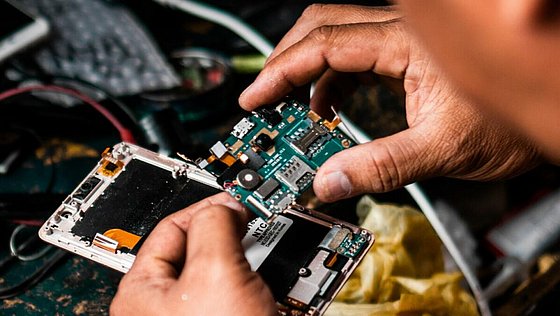
Repair of electrical appliances
Karsten Schmidtseifer / Mechanical Engineering
Photo: UniService Transfer
Germany produces around one million tonnes of electric bulkhead per year
The mechanical engineer Karsten Schmidtseifer on the customer's right to repair electrical appliances and the consequences for manufacturers
Everyone knows the situation: once again the washing machine and tumble dryer give up the ghost at the same time. Frustrated, we then talk about Murphy's Law and as repairs are often expensive, we quickly look around for new replacements and have our old appliances disposed of when the new ones are delivered. At the University of Wuppertal, Karsten Schmidtseifer, a research assistant in the design section of the school of mechanical engineering and safety engineering, is researching the reparability of electrical appliances and says: "In 2022 alone, 62 million tonnes of e-waste were produced worldwide, 1 million tonnes of which were produced in Germany alone, and the trend is rising. We are talking about growth rates for e-waste in Germany of around 10% per year."
Citizens would rather have their devices repaired
Although, according to a Eurobarometer survey from 2022, around 77% of EU citizens would rather have their electrical appliances repaired than thrown away, too little is still happening today. In Schmidtseifer's opinion, this is not because the idea of recycling is maturing too slowly. "The problem is that people are creatures of habit. When new mobile phones, cars or washing machines are cheap, people buy new. But now, with inflation and the wars, prices are rising and people are realising that everything suddenly costs a lot more. They then try to keep the products for longer, and so the issue becomes more prominent. We also have different public relations work today."
Right to repair in the EU since April 2024
In March 2023, the European Commission presented a proposal for a directive on a right to repair, which was adopted by the European Parliament on 23 April 2024. But what does this mean for consumers?
Schmidtseifer explains: "This is yet another amendment on top of the Ecodesign Directive adopted in 2009, the so-called 2009/125/EC. This is now amended every few years." In the last amendment in 2022, the reparability of a few product groups was already specified, i.e. it was determined which spare parts should be available, how the availability of the spare parts should be established and what the pricing should be. "This change now goes even further," he continues. "The manufacturer is now obliged to provide information on the repair service, i.e. they must now issue instructions so that you can perhaps carry out the repair yourself." Another new feature is a kind of voucher programme, which has already proved its worth in Austria. This would allow the customer to get something back from the state for the paid repair, a kind of subsidy programme to motivate people to take part. This means that once the statutory warranty has expired, consumers can now demand a simpler and cheaper repair of defects in almost all devices that must be technically repairable. "The current regulation includes white goods (white goods are certain classes of large electrical appliances such as washing machines, dryers or refrigerators, editor's note), monitors, tablets and smartphones," explains the scientist and continues: "The next amendment to the Ecodesign Directive is already on the horizon, which will be the ESPR (Ecodesign for Sustainable Products Regulation). As soon as this comes into force, all products will actually be affected, with the exception of food, medicines and plants. That will certainly come next year."
European repair platform
From now on, all manufacturers will be obliged to provide information about their repair services and the costs incurred. A European repair platform will also be set up for this purpose. "The regulation for spare parts has already been in place since 2022, where information is provided on how quickly a spare part must be available and the price may only be x per cent of the new price. What's new is that there is now a central overview where I as a customer can find out about the nearest company that is authorised to carry out repairs."
A throwaway society can become a recycling society
Schmidtseifer believes that social change is already in full swing and says: "We can see from all the youth campaigns, such as Fridays for future, that there is great interest in change, because young people still want something from the earth. And we also see it the other way round in the laws that have been passed. For example, the Green Deal (the European Green Deal is a concept presented by the European Commission on 11 December 2019 with the aim of reducing net greenhouse gas emissions in the European Union to zero by 2050, editor's note), which was only planned for 2050, has been brought forward to 2045, i.e. the pressure is increasing immensely and people are realising that the window of opportunity is narrowing." However, Schmidtseifer also notes that the results we already have are being communicated incorrectly, as the issue is being blown up in the media and only individual positions are being emphasised. Unfortunately, you never get to see the big picture. He gives an example: "This year, I supervised a final thesis that investigated how pedelecs can be made more sustainable. It discussed all the methods for increasing sustainability that exist and that are actually available. The result was that if we were to apply all the methods we currently have to a bike like this, we could save 72%CO2 during production. But we just don't do it."
No clear definition
An electrical repair shop in Wuppertal already advertises with the slogan: 'Repair instead of throw away' and writes: "We are committed to sustainability and against wasting valuable resources" and offers to repair devices from all manufacturers. However, repairs are sometimes tricky because the labelling is missing. "What you have to do is actually already in the directive," says Schmidtseifer. "It must be possible to carry out the repair using standard tools. But that includes a soldering iron, for example, and that's not something that every layperson can do. We need a clear definition of how repairs should be carried out and then also strict implementation with penalties, because so far all manufacturers have actually got away with it."
Companies offer refurbished devices
For manufacturing companies, the new guidelines are now resulting in additional costs, and of course they will not accept this without complaint, explains Schmidtseifer, because "companies must always act economically, i.e. they must now turn risks into opportunities. There are many providers who now offer refurbished devices (refurbished devices are used, refurbished devices that are technically in perfect working order, editor's note). These X-as-a-Service stories are also on the rise, i.e. I no longer buy a product, I just use the service." The service can already be used for washing machines. You get a washing machine from the manufacturer and pay a monthly rental fee. If it breaks down, you have nothing more to do with it. "If I no longer want to use the service, the appliance goes back to the provider, who then takes responsibility for the machine and is naturally interested in a longer service life."
The Freiburg Institute for Applied Ecology has calculated that by using household appliances such as washing machines, televisions, notebooks and smartphones for longer, almost four million tonnes of climate-damaging greenhouse gases can be saved in Germany every year. However, many repair companies complain that new appliances are often practically irreparable. This gives the impression that sustainability is still not that important to manufacturers. "I don't think the manufacturers don't care, because every company also employs young people who have children and who want to continue living the way we do," says Schmidtseifer. We should therefore not increase the pressure, but rather create incentives, and refurbished products are an initial idea.

Repairing a smartphone
Photo: public domain
Excessive spare parts prices prevent repairs
The Federal Environment Agency has already established that repairs can be prevented by excessive spare parts prices, meaning that appliances are disposed of after all - a problem that needs to be discussed again with the industry. Schmidtseifer comments: "Yes, definitely. It must be defined more strictly and offences must be punished. I myself replaced my washing machine two years ago because it was getting louder and the bearing had probably broken. I then looked online in this spare parts catalogue, which must officially exist, and found the spare part. But then it turned out that the bearing I could replace was welded to the drum, and that would have led to a much larger repair and would have cost at least 65% of the purchase price, not counting the installation time. That was uneconomical. There need to be strict rules for product groups, because you don't have to solve it like this using my washing machine as an example. It can also be organised differently."
Researching the life cycle of electrical appliances
Karsten Schmidtseifer is a doctoral student at in the Design section and is researching the repairability of electrical appliances. "I'm looking at the features that make it possible to use products sustainably for more than one life cycle. A striking example of this: If you have a smartphone, you can remove many of its circuit boards and continue to use them. Some chips could be reused in Bluetooth devices, for example." Unfortunately, there are still no markers that clearly regulate reuse, but the interest from students is immense. "We have a lot of theses on this topic here in the department. In the two years I've been working here, I've already supervised 15 theses on the topic of sustainability. The topic is growing enormously." In conclusion, Schmidtseifer emphasises that it is the task of universities and society to educate people and teach them what sustainability actually is. "If I know about it, then I can also decide whether I want to change something. There is no way around the fact that we have to give products clear specifications without restricting innovation, because reparability must be guaranteed."
Uwe Blass
Karsten Schmidtseifer is a research assistant in the Design section of the school of mechanical engineering and safety engineering at the University of Wuppertal.
